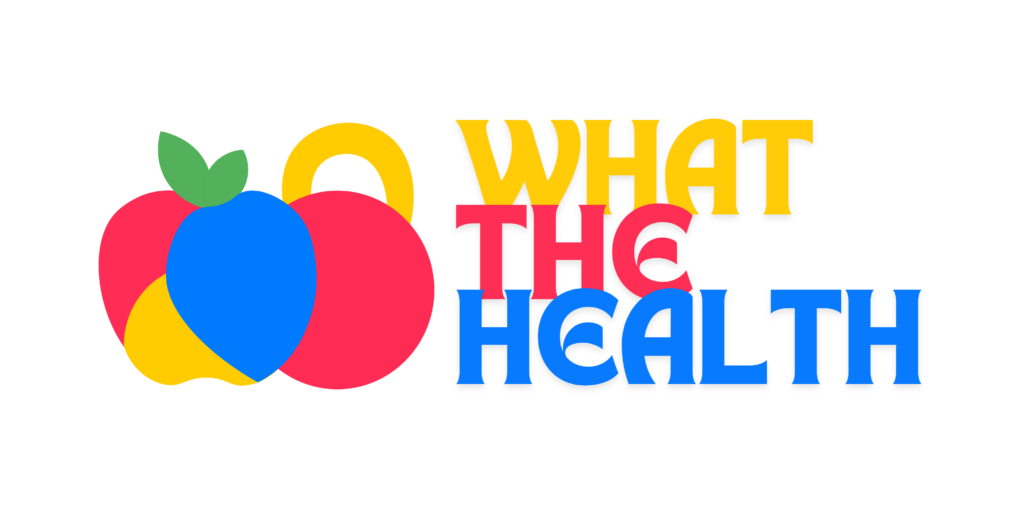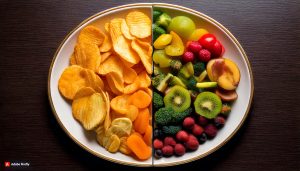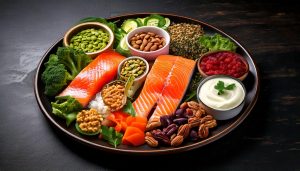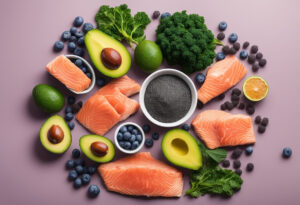PAGE CONTENT:
Understanding Antioxidants: What They Are and How They Benefit Your Health
Antioxidants are compounds that play a crucial role in maintaining your health by protecting your body from damage caused by free radicals—unstable molecules that can harm cells and contribute to aging and diseases such as cancer and heart disease. Found naturally in a variety of foods, especially fruits, vegetables, and nuts, antioxidants work by neutralizing free radicals, preventing them from causing oxidative stress. This stress, if left unchecked, can lead to chronic inflammation and a host of health issues. Over the years, antioxidants have gained significant attention for their potential health benefits, including their ability to support the immune system, improve skin health, and reduce the risk of chronic diseases. Understanding what antioxidants are, how they function, and the best sources to include in your diet can help you harness their full benefits. This article delves into the science behind antioxidants, exploring their importance for your health and how you can ensure you’re getting enough of them through your diet.
What Are Antioxidants and How Do They Work?
Antioxidants are molecules that inhibit the oxidation of other molecules. Oxidation is a chemical reaction that can produce free radicals, leading to chain reactions that may damage cells. Antioxidants such as vitamins C and E, beta-carotene, and selenium, as well as polyphenols found in plants, work by donating electrons to free radicals, stabilizing them and preventing cell damage. This process is essential because oxidative stress, the imbalance between free radicals and antioxidants in the body, is associated with various diseases, including cancer, cardiovascular diseases, and neurodegenerative disorders. By counteracting oxidative stress, antioxidants help protect your cells and tissues from damage and support overall health.
Why Are Antioxidants Important for Health?
Antioxidants are vital for maintaining good health and preventing disease. They help protect your cells from the damage caused by oxidative stress, which is linked to a wide range of chronic conditions. For example, the antioxidant properties of vitamin C are well-known for supporting immune function and skin health, while vitamin E is crucial for protecting cell membranes from damage. Moreover, antioxidants are believed to play a role in reducing inflammation, which is a key factor in many chronic diseases, including heart disease and arthritis. Additionally, research suggests that antioxidants may help slow down the aging process by protecting cells from damage that accumulates over time. By incorporating antioxidant-rich foods into your diet, you can enhance your body’s defense mechanisms and promote long-term health.
How Can You Increase Antioxidant Intake in Your Diet?
Increasing your antioxidant intake is relatively easy with the right dietary choices. A diet rich in colorful fruits and vegetables is one of the best ways to boost your antioxidant levels. Foods like berries, spinach, kale, nuts, and dark chocolate are particularly high in antioxidants. Additionally, green tea and coffee are excellent sources of antioxidants, thanks to their high levels of polyphenols. It’s important to eat a variety of these foods to ensure you’re getting a broad range of antioxidants. Cooking methods also matter; for instance, lightly steaming vegetables can preserve their antioxidant content better than boiling them. Moreover, some antioxidants are better absorbed when consumed with fat, so including healthy fats like olive oil or avocado in your meals can enhance their effectiveness.
What Are the Potential Downsides of Antioxidants?
While antioxidants are beneficial, it’s possible to have too much of a good thing. Overconsumption of antioxidant supplements, rather than getting them from food, can sometimes lead to negative effects. For example, high doses of vitamin E have been associated with an increased risk of hemorrhagic stroke, and excessive beta-carotene intake has been linked to a higher risk of lung cancer in smokers. Moreover, while antioxidants help prevent cell damage, they can also interfere with certain medical treatments like chemotherapy, where oxidative stress is used to kill cancer cells. Therefore, it’s generally advised to obtain antioxidants from a balanced diet rather than supplements, unless specifically recommended by a healthcare provider.
How Do Antioxidants Support Skin Health?
Antioxidants are widely recognized for their role in promoting healthy skin. They protect the skin from damage caused by environmental factors like UV radiation and pollution, which can lead to premature aging, wrinkles, and hyperpigmentation. Vitamin C, for example, is essential for collagen production, which helps keep the skin firm and elastic. Vitamin E works to protect the skin from damage caused by free radicals and helps maintain moisture. Additionally, antioxidants like beta-carotene can enhance the skin’s natural defense against UV rays. Many skincare products now include antioxidants due to their protective and rejuvenating properties, making them a key component of anti-aging regimens. Incorporating antioxidant-rich foods into your diet can complement topical skincare treatments, leading to healthier, more resilient skin.
SUMMARY
Antioxidants are powerful compounds that play a crucial role in protecting your body from oxidative stress and its associated health risks. They help neutralize free radicals, reducing the risk of chronic diseases and supporting overall health. While it’s important to include a variety of antioxidant-rich foods in your diet, moderation is key, as excessive supplementation can lead to adverse effects. Antioxidants also contribute to skin health by protecting against environmental damage and supporting skin repair. By understanding the role of antioxidants and incorporating them into your diet through fruits, vegetables, nuts, and other nutrient-rich foods, you can enhance your health and well-being.












110 Responses
Test
аккаунты с балансом магазин аккаунтов социальных сетей
покупка аккаунтов продать аккаунт
заработок на аккаунтах https://magazin-akkauntov-online.ru
заработок на аккаунтах маркетплейс аккаунтов
маркетплейс аккаунтов маркетплейс для реселлеров
профиль с подписчиками платформа для покупки аккаунтов
перепродажа аккаунтов https://pokupka-akkauntov-online.ru/
Marketplace for Ready-Made Accounts Sell Account
Account Purchase Sell Account
Account market https://socialaccountsmarket2025.com
Marketplace for Ready-Made Accounts Sell Pre-made Account
Guaranteed Accounts Account Market
Website for Buying Accounts Account Trading Platform
Account Exchange Service Account Store
Guaranteed Accounts Account Buying Service
Purchase Ready-Made Accounts Account Buying Platform
Account Buying Service Purchase Ready-Made Accounts
Database of Accounts for Sale Account Market
account sale verified accounts for sale
account buying platform account exchange
verified accounts for sale account exchange
account selling service account store
account exchange service profitable account sales
account store sell account
accounts market account exchange service
marketplace for ready-made accounts account trading service
ready-made accounts for sale marketplace for ready-made accounts
website for buying accounts find accounts for sale
account catalog online account store
account exchange service secure account purchasing platform
gaming account marketplace accounts-buy.org
sell pre-made account purchase ready-made accounts
marketplace for ready-made accounts account trading platform
buy pre-made account account exchange
purchase ready-made accounts accounts market
account sale https://best-social-accounts.org
account sale account buying platform
accounts for sale account sale
account marketplace profitable account sales
account selling service website for buying accounts
account buying service account selling platform
database of accounts for sale purchase ready-made accounts
buy and sell accounts account trading service
website for buying accounts account trading service
marketplace for ready-made accounts database of accounts for sale
account trading service account exchange service
account trading service https://accounts-offer.org/
database of accounts for sale accounts market
buy pre-made account https://buy-best-accounts.org
accounts marketplace https://social-accounts-marketplaces.live
accounts market https://accounts-marketplace.live/
account sale https://social-accounts-marketplace.xyz/
sell accounts https://buy-accounts.space
account catalog https://buy-accounts-shop.pro/
account trading https://buy-accounts.live
account trading https://social-accounts-marketplace.live
account market https://accounts-marketplace.online/
profitable account sales https://accounts-marketplace-best.pro
купить аккаунт akkaunty-na-prodazhu.pro
магазин аккаунтов rynok-akkauntov.top
продажа аккаунтов https://kupit-akkaunt.xyz/
маркетплейс аккаунтов соцсетей https://akkaunt-magazin.online
маркетплейс аккаунтов akkaunty-market.live
маркетплейс аккаунтов kupit-akkaunty-market.xyz
маркетплейс аккаунтов соцсетей akkaunty-optom.live
продать аккаунт https://online-akkaunty-magazin.xyz/
маркетплейс аккаунтов https://akkaunty-dlya-prodazhi.pro/
маркетплейс аккаунтов https://kupit-akkaunt.online
facebook ad account buy facebook ad accounts for sale
buy facebook ad accounts https://buy-ad-accounts.click
buy fb ad account facebook ad account buy
buy facebook ads account https://buy-ads-account.click
buy fb ad account https://ad-account-buy.top/
buying fb accounts https://buy-ads-account.work
buy facebook accounts https://ad-account-for-sale.top
buy old facebook account for ads buy a facebook account
buy fb ads account https://ad-accounts-for-sale.work
buy google ads threshold accounts buy google adwords accounts
buy aged google ads accounts buy google ads threshold accounts
facebook account buy buy facebook ads manager
buy adwords account buy google ads agency account
buy aged google ads accounts buy google ads invoice account
buy google ads https://buy-ads-invoice-account.top
buy google ads accounts https://buy-account-ads.work
buy google adwords account https://buy-ads-agency-account.top
buy google ads invoice account google ads account seller
buy account google ads https://ads-agency-account-buy.click/
facebook verified business manager for sale https://buy-business-manager.org
buy google ads agency account buy account google ads
buy facebook bm https://buy-bm-account.org
buy facebook business manager verified buy-business-manager-acc.org
buy facebook business manager verified https://buy-verified-business-manager-account.org/
facebook business manager buy buy-verified-business-manager.org
buy facebook business manager accounts https://business-manager-for-sale.org
fb bussiness manager buy verified bm
facebook business manager for sale buy-bm.org
buy facebook bm account verified-business-manager-for-sale.org
buy tiktok ad account https://buy-tiktok-ads-account.org
buy tiktok ad account https://tiktok-ads-account-buy.org
tiktok ads agency account https://tiktok-ads-account-for-sale.org
tiktok agency account for sale https://tiktok-agency-account-for-sale.org
buy tiktok ads https://buy-tiktok-ad-account.org
tiktok agency account for sale https://buy-tiktok-ads-accounts.org
tiktok agency account for sale https://buy-tiktok-ads.org
buy tiktok business account https://buy-tiktok-business-account.org
buy tiktok ads buy tiktok ads account
buy facebook advertising accounts website for selling accounts account trading
buy facebook ads manager account trading platform account market
you’ve got a fantastic blog right here! would you wish to make some invite posts on my blog?